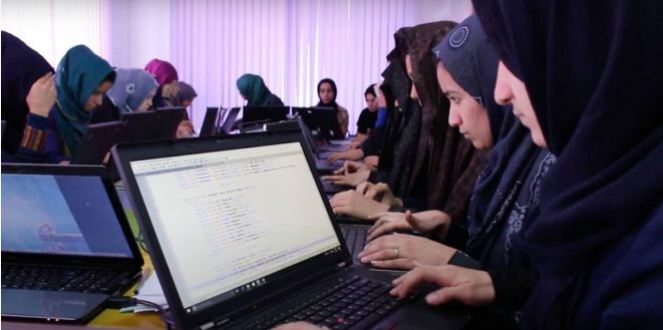KABUL, Sept 25 – In response to the ban on girls’ education imposed by the Taliban, the “Women’s Online University” has emerged as a beacon of hope, providing educational opportunities for approximately 14,000 female students across diverse fields of study. Established about nine months ago, this institution, led by Abdul Farid Salangi and a team of dedicated professors, aims to bridge the educational gap faced by Afghan girls.
Amid the closure of traditional educational institutions under the Taliban’s rule, the Women’s Online University has stepped up to ensure girls’ access to quality education. Currently, it boasts an impressive enrollment of 14,000 students, distributed among 14 different academic disciplines.
Adela Zamani, the university’s Vice Chancellor, highlighted in an interview with Khaama Press News Agency, “The number of applicants is high, and for now, we are providing education to 14,000 students in 14 faculties as a standard.” She emphasized the university’s commitment to maintaining a high standard of education despite the challenging circumstances.
The university’s teaching staff, numbering 450 instructors, conducts classes both within and outside Afghanistan. These dedicated educators are determined to deliver a wide range of subjects to their eager students.
The Women’s Online University acknowledges that while online education cannot fully replace the in-person classroom experience, it serves as a lifeline to keep girls connected to the academic world. Adela Zamani emphasized the importance of knowledge and revealed plans for capacity-building programs to inspire girls and nurture hope for their future.
Professor Mohammad Ramin Alkozai, teaching at the Engineering Faculty of the Women’s University, passionately provides engineering subjects to girls who have been excluded from traditional education. He shared, “I prepare visual course materials and make them available to students, and we have online sessions twice a week.”
For students like Sahar Sharifi, a journalism student at the Women’s Online University, online classes are an opportunity to bridge the educational gap left by the closure of physical universities. She expressed her gratitude, saying, “I am glad to be a part of the Women’s Online University. While our dreams seem unattainable, this university can be a gateway to education.”
Krishna Amiri, another student, highlighted the resilience of these girls, stating that despite the limitations, they can continue their studies from the comfort of their homes.
The ban on girls’ education in Afghanistan extends beyond university-level education; even girls above the sixth grade face an uncertain future. Despite the Taliban government’s talk of reopening educational doors for girls, practical steps have yet to be taken, leaving these young minds in limbo. The Women’s Online University remains a vital lifeline, offering hope and education to thousands of Afghan girls determined to pursue their dreams.

















